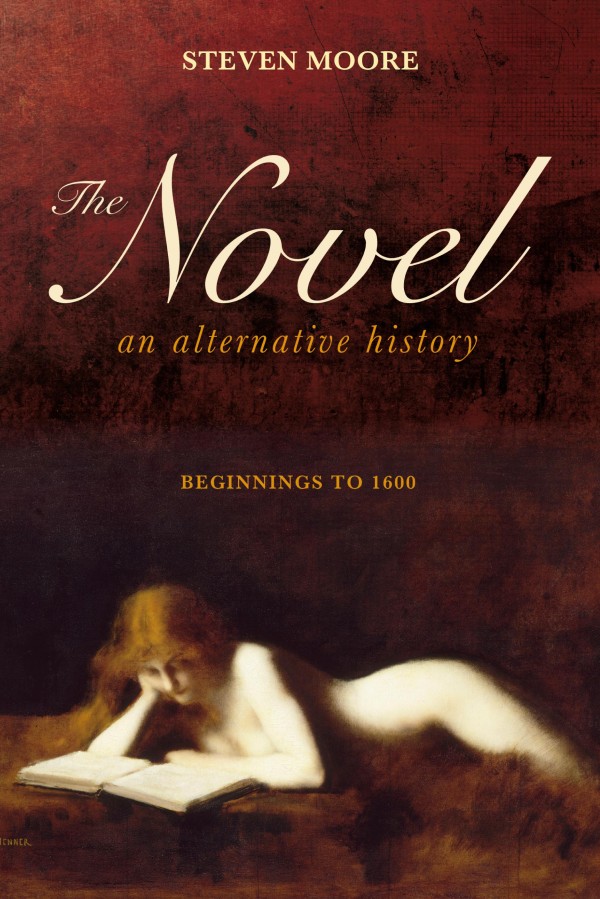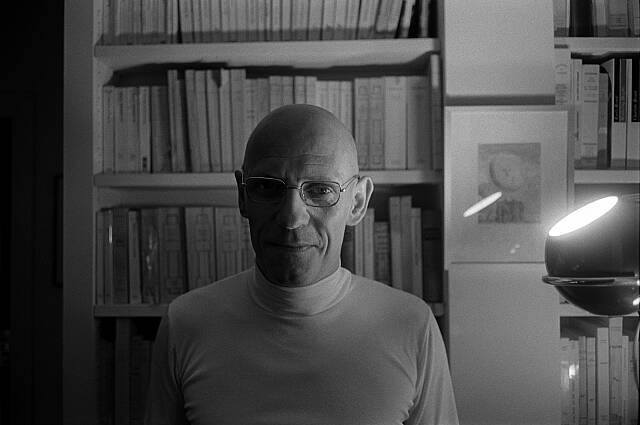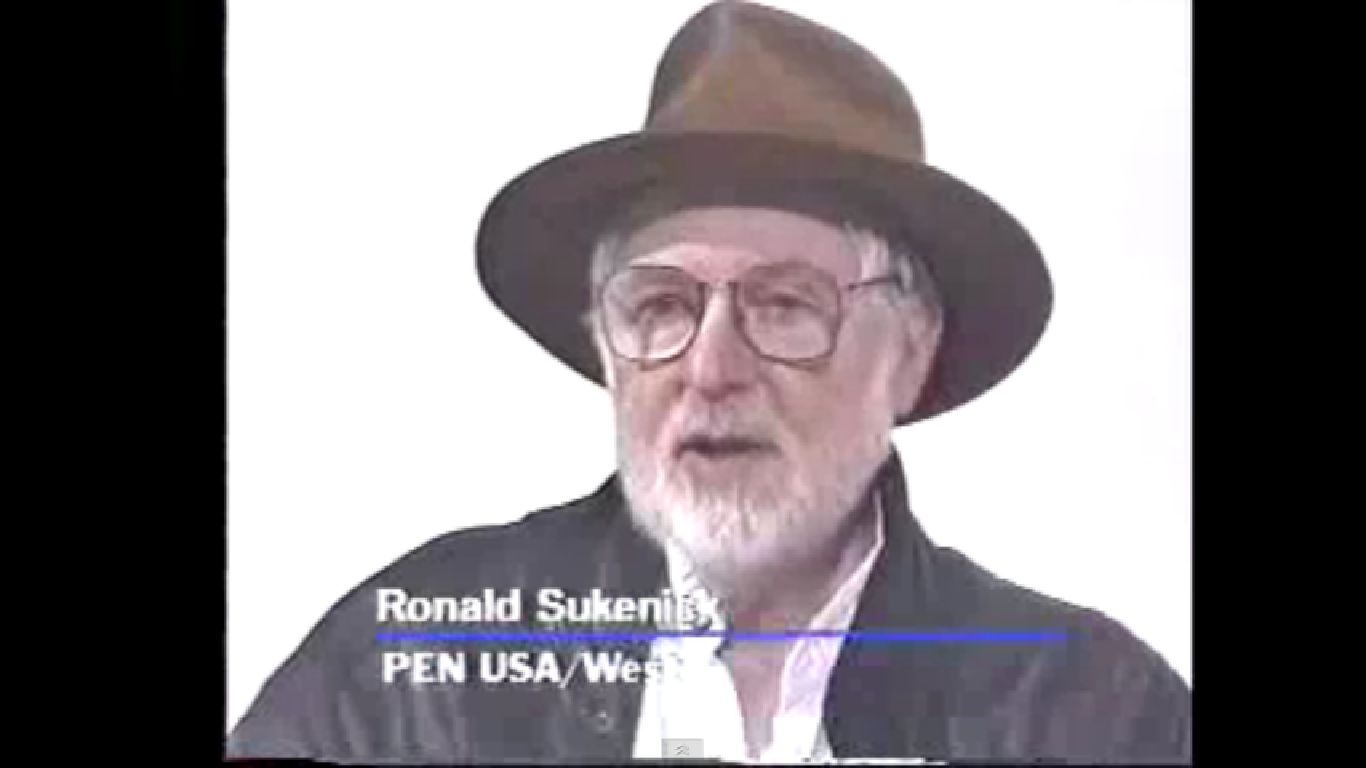Thanks, Goodbye, & A Power Quote From Ronald Sukenick
This new thing is a style that we have come to call the Bossa Nova, an elaboration of the new tradition. Needless to say the Bossa Nova has no plot, no story, no character, no chronological sequence, no verisimilitude, no imitation, no allegory, no symbolism, no subject matter, no “meaning.” It resists interpretation because it doesn’t want to be interpreted, but is very easy to understand once you forget about analyzing it. The Bossa Nova is nonrepresentational — it represents itself. Its main qualities are abstraction, improvisation, and opacity. (pg. 211)
— Ronald Sukenick, In Form: Digressions on the Act of Fiction (Southern Illinois University Press, 1985)
***
I’ve had this power quote in draft mode for a long time. Since the end is nigh, I thought I’d go ahead and post it.
Also, I wanted to say thank you to Blake for bringing me on board — I began writing for HTMLGIANT on July 16th, 2009 — and to the other contributors for their consistently engaging work. This site has meant a lot to me. It opened many doors, introduced me to many new writers and new ways of thinking about writing and publishing. I greatly appreciate the opportunity to have been a part of this community.
Thinking about how literary historians of the future will write about this place and its people, I smile. While it did get ugly around here from time to time, I think Giant succeeded more often than it failed.
If you haven’t read it yet, Peter Tieryas Liu wrote a thoughtful piece about us at ENTROPY where he says, “There were many orbits and star systems within HTMLGiant. When people made comments like, HTMLGiant this and HTMLGiant that, I wondered, which HTMLGiant?”
For me, that nails it. We were never one thing. We were a spot where a bunch of different book-passionate voices came together to clash and splash and share ideas.
This place will be missed.
Power Quote: Finnegans Wake
Power Quote: Andreas Huyssen

In traditional bourgeois culture the avantgarde was successful in sustaining difference. Within the project of modernity it launched a successful assault on 19th-century aestheticism, which insisted on the absolute autonomy of art, and on traditional realism, which remained locked into the dogma of mimetic representation and referentiality. Postmodernism has lost that capacity to gain shock value from difference, except perhaps in relation to forms of a very traditional aesthetic conservatism. The counter-measures the historical avantgarde proposed to break the grip of bourgeois institutionalized culture are no longer effective. The reasons that avantgardism is no longer viable today can be located not only in the culture industry’s capacity to co-opt, reproduce, and comodify, but, more interestingly, in the avantgarde itself. Despite the power and integrity of its attacks against traditional bourgeois culture and against the deprivations of capitalism, there are moments in the historical avantgarde which show how deeply avantgardism itself is implicated in the Western tradition of growth and progress.
–Andreas Huyssen – After The Great Divide: Modernism, Mass Culture, Postmodernism (Indiana University Press, 1986)
Power Quote: Trinh T. Minh-Ha

To use language well, says the voice of literacy, cherish its classic form. Do not choose the offbeat at the cost of clarity. Obscurity is an imposition on the reader. True, but beware when you cross railroad tracks for one train may hide another train. Clarity is a means of subjection, a quality both of official, taught language and of correct writing, two old mates of power: together they flow, together they flower, vertically, to impose an order. Let us not forget that writers who advocate the instrumentality of language are often those who cannot or choose not to see the suchness of things—a language as language—and therefore, continue to preach conformity to the norms of well-behaved writing: principles of composition, style, genre, correction, and improvement. To write “clearly,” one must incessantly prune, eliminate, forbid, purge, purify; in other words, practice what may be called an “ablution of language” (Roland Barthes). (pg. 16-17)
Trinh T. Minh-Ha – Woman, Native, Other: Writing Postcoloniality and Feminism (Indiana University Press, 2009)
Power Quote: Steven Moore

Do you want to know a secret? Literature is not for everyone. People grant that about other arts — serial music isn’t for everyone, nor is Balinese shadow dancing — but when it comes to fiction, there’s a democratic assumption that anyone with a basic education should be able to read and enjoy any novel…Why this bleeding-heart concern for “the mass of readers,” “the common reader?” (page 24)
Power Quote: Hélène Cixous

This is how I would define a feminine textual body: as a female libidinal economy, a regime, energies, a system of spending not necessarily carved out by culture. A feminine textual body is recognized by the fact that it is always endless, without ending: there’s no closure, it doesn’t stop, and it’s this that very often makes the feminine text difficult to read. For we’ve learned to read books that basically pose the word “end.” But this one doesn’t finish, a feminine text goes on and on and at a certain moment the volume comes to an end but the writing continues and for the reader this means being thrust into the voice. These are texts that work on the beginning but not on the origin. The origin is a masculine myth: I always want to know where I come from. The question “Where do children come from?” is basically a masculine, much more than feminine, question. The quest for origins, illustrated by Oedipus, doesn’t haunt a feminine unconscious. Rather it’s the beginning, or beginnings, the manner of beginning, not promptly with the phallus in order to close with the phallus, but starting on all sides at once, that makes a feminine writing. A feminine text starts on all sides at once starts twenty times, thirty times, over.
–from “Castration or Decapitation?” trans. by Annette Kiihn, included in French Feminism Reader (pg. 287)
Power Quote: Judith Butler

It would be a mistake to think that received grammar is the best vehicle for expressing radical views, given the constraints that grammar imposes upon thought, indeed, upon the thinkable itself. But formulations that twist grammar or that implicitly call into question the subject-verb requirements of propositional sense are clearly irritating to some. They produce more work for their readers, and sometimes their readers are offended by such demands. Are those who are offended making a legitimate request for “plain speaking” or does their complaint emerge from a consumer expectation of intellectual life? Is there, perhaps, a value to be derived from such experiences of linguistic difficulty? If gender itself is naturalized through grammatical norms, as Monique Wittig has argued, then the alteration of gender at the most fundamental epistemic level will be conducted, in part, through contesting the grammar in which gender is given.
(from Gender Trouble, pages xix-xx)
“The most important and enjoyable thing in life is doing something that’s a complicated, tricky problem for you that you don’t know how to solve.” -William Vollmann
Power Quote: Foucault on Creation

“My desire is that a book, at least for the person who wrote it, should be nothing other than the sentences of which it is made; that it should not be doubled by that first simulacrum of itself which is a preface, whose intention is to lay down the law for all the simulacra which are to be formed in the future on its basis. My desire is that this object-event, almost imperceptible among so many others, should recopy, fragment, repeat, simulate and replicate itself, and finally disappear without the person who happened to produce it ever being able to claim the right to be its master, and impose what he wished to say, or say what he wanted it to be. In short, my desire is that a book should not create of its own accord that status of text to which teaching and criticism will all too probably reduce it, but that it should have the easy confidence to present itself as discourse: as both battle and weapon, strategy and shock, struggle and trophy or wound, conjuncture and vestige, strange meeting and repeatable scene.”
[from the preface to the 1972 edition of History of Madness]
This is either “Power Quote: Louis CK,” or “Louis CK on Writing”

“I just wanted to buy a trumpet to learn how to play trumpet. I went in to Sam Ash, or one of those places, and there were all these student trumpets for, like $100. The guy started showing me, you know, here’s like a nickel-plated, beautiful trumpet and it’s got a flawed bell because it was hurt, but they had repaired it. And it was $1400. I didn’t have any of that kind of money. But I went to an ATM and I took out everything I had in the bank, and I bought this fucking $1400 trumpet without having any ability. I’d never even blown into a trumpet before. And then I was walking through Times Square with this fucking thing in my hand, and just freaking out and feeling bad. And I went and ducked into one of those peep shows. Next thing I know I’m in a peep show booth, one of those upright coffins, looking at a chick—a tired Latvian girl, probably—through the window of this peep show and jacking off. And it’s a two-foot by two-foot room. So I jerk off and I came on the trumpet case, which was standing between my legs. And once I came, and I looked at the come on this beautiful, brass-buckled trumpet case, I realized that if I had come to this peep show first, I could’ve saved $1400.”
The very, very funny Louis CK explains the boundaries of ambition. From the October 4, 2010 episode of WTF with Marc Maron.
Begs the questionRaises the question: better that he bought it or better to have headed to the peep show first?
Me? Gotta go trumpet.
UPDATE: Schooled. Thanks for the links.

